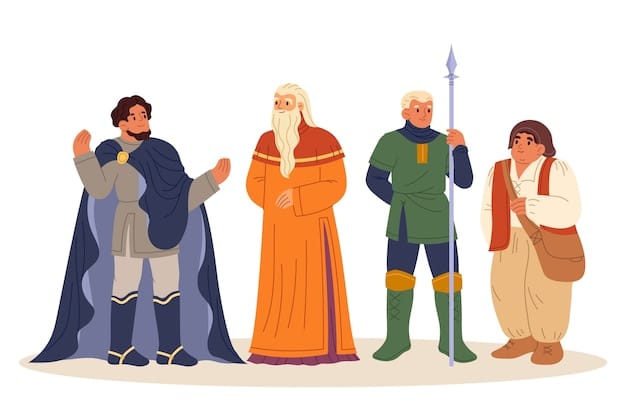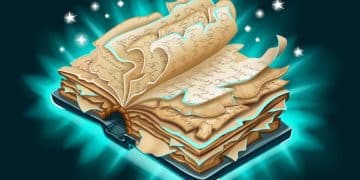Unveiling the History of Magic: New Occult Texts Explored

The History of Magic: Uncovering Hidden Truths in Newly Released Historical Occult Texts delves into newly accessible historical documents, shedding light on the evolution of magical practices, beliefs, and their impact on society, offering new perspectives on ancient esoteric knowledge and its relevance today.
The world of magic has always been shrouded in mystery, with its secrets carefully guarded and often misunderstood. But what if newly released historical texts could unlock hidden truths, offering a fresh perspective on the evolution of magical practices? Let’s delve into the history of magic: uncovering hidden truths in newly released historical occult texts.
Exploring the Origins of Magic: Ancient Civilizations
Magic’s roots stretch back to the dawn of civilization, intertwining with early human attempts to understand and influence the world around them. From ancient Egypt to Mesopotamia, magical practices were deeply embedded in religious and daily life.
These civilizations saw magic not as separate from religion or science but as an integral part of their worldview. Understanding these origins provides a crucial foundation for appreciating the later developments in the history of magic.
Egyptian Magic: Rituals and Spells
Ancient Egypt is renowned for its elaborate magical system, deeply intertwined with its religious beliefs. Egyptian magic focused on maintaining cosmic order (Ma’at) and ensuring the well-being of both the living and the dead.
Rituals, spells, and amulets were employed to protect against evil spirits, heal illnesses, and secure a prosperous afterlife. Texts like the Book of the Dead offer insights into their complex magical practices.
Mesopotamian Magic: Divination and Protection
In Mesopotamia, magic was closely linked to divination and the interpretation of omens. Priests and sorcerers sought to understand the will of the gods and predict future events using astrology, hepatoscopy (examining the liver of sacrificed animals), and other methods.
Protective spells and rituals were also common, aimed at warding off demons and ensuring the safety of individuals and communities.
- Magic was closely tied to ensuring successful harvests and fertility.
- Incantations and amulets were used to protect against diseases and curses.
- The role of the magician or priest was central to maintaining balance and harmony.
In summary, the origins of magic in ancient civilizations reflect humanity’s earliest attempts to understand and control the forces of nature and the supernatural. These practices laid the groundwork for later magical traditions and continue to fascinate scholars and practitioners today.
The Role of Magic in the Medieval Period
The medieval period witnessed a complex relationship with magic, shaped by the influence of Christianity and the rediscovery of classical texts. Magic was both condemned as heresy and embraced as a means of understanding the natural world.
This era saw the rise of grimoires, the persecution of alleged witches, and the development of sophisticated magical theories by natural philosophers.

Grimoires: Compendiums of Magical Knowledge
Grimoires, or spellbooks, became increasingly popular during the medieval period. These texts contained a wide range of magical instructions, including spells, rituals, and invocations of spirits. They often blended elements of Christian theology, Jewish Kabbalah, and pagan traditions.
Grimoires served as practical guides for magicians seeking to perform a variety of tasks, from healing the sick to controlling the weather.
The Witch Hunts: Fear and Persecution
The witch hunts that swept across Europe during the late medieval and early modern periods represent a dark chapter in the history of magic. Fueled by religious fervor and social anxieties, countless individuals, primarily women, were accused of witchcraft and subjected to torture, imprisonment, and execution.
These persecutions were based on the belief that witches derived their power from a pact with the Devil and posed a threat to the Christian community.
- The Malleus Maleficarum, or “Hammer of Witches,” served as a manual for witch hunters.
- Accusations of witchcraft often stemmed from personal conflicts or social tensions.
- The witch hunts resulted in the deaths of tens of thousands of innocent people.
The medieval period’s treatment of magic was deeply influenced by the prevailing religious and social climate. While some forms of magic were condemned and persecuted, others were embraced as tools for understanding nature and achieving practical goals. This duality shaped the development of magical traditions in the centuries that followed.
Renaissance Magic: A Revival of Ancient Wisdom
The Renaissance witnessed a resurgence of interest in ancient Greek and Roman texts, leading to a renewed appreciation for the magical traditions of the past. Renaissance magicians sought to synthesize these traditions with Christian theology and natural philosophy, creating a unique blend of spiritual and intellectual pursuits.
Figures like Marsilio Ficino and Pico della Mirandola played a pivotal role in reviving Hermeticism and Kabbalah, which had a profound influence on Renaissance magic.
Hermeticism: The Wisdom of Hermes Trismegistus
Hermeticism, attributed to the legendary figure Hermes Trismegistus, offered a comprehensive worldview encompassing theology, philosophy, and magic. Hermetic texts emphasized the interconnectedness of all things and the potential for humans to achieve divine knowledge and power through mystical practices.
Renaissance magicians saw Hermeticism as a path to spiritual enlightenment and a means of understanding the hidden forces of nature.
Kabbalah: Unveiling the Mysteries of God
Kabbalah, a mystical tradition within Judaism, also experienced a revival during the Renaissance. Kabbalistic texts explored the hidden meanings of the Hebrew scriptures and offered a system of symbolic interpretation that could be used to unlock divine secrets.
Renaissance magicians integrated Kabbalistic concepts into their magical practices, using them to create powerful amulets, talismans, and rituals.
- The Corpus Hermeticum was rediscovered, sparking a wave of Hermetic scholarship.
- Pico della Mirandola’s “Oration on the Dignity of Man” celebrated the potential of human beings to achieve greatness through knowledge and virtue.
- Renaissance magicians often sought to combine Hermeticism, Kabbalah, and Christian theology into a unified system of thought.
In essence, Renaissance magic represented a synthesis of ancient wisdom, Christian belief, and natural philosophy. This fusion of ideas gave rise to new magical practices and theories that continue to influence esoteric traditions today.
The Enlightenment and the Decline of Magic
The Enlightenment, with its emphasis on reason, empiricism, and scientific inquiry, marked a turning point in the history of magic. As scientific explanations gained prominence, magical beliefs and practices were increasingly marginalized and relegated to the realm of superstition.
However, magic did not disappear entirely during the Enlightenment. Instead, it evolved and adapted, finding new forms of expression in secret societies and esoteric orders.
The Rise of Scientific Rationalism
The scientific revolution of the 16th and 17th centuries laid the groundwork for the Enlightenment’s emphasis on reason and empirical observation. Scientific discoveries challenged traditional beliefs about the natural world, leading to a decline in the credibility of magical explanations.
Figures like Isaac Newton, while deeply interested in alchemy and esoteric knowledge, also contributed to the development of scientific methods that undermined traditional magic.
Secret Societies and Esoteric Orders
Despite the decline of public belief in magic, secret societies and esoteric orders continued to thrive during the Enlightenment. These groups provided a space for individuals interested in exploring magical traditions and pursuing spiritual enlightenment outside the mainstream institutions.
Organizations like the Freemasons and the Rosicrucians attracted members from all walks of life and played a significant role in preserving and transmitting esoteric knowledge.

- The Enlightenment’s emphasis on reason led to the secularization of knowledge and the decline of religious authority.
- Secret societies provided a refuge for those interested in exploring magical traditions outside the mainstream.
- The development of scientific methods challenged the credibility of magical explanations.
In conclusion, the Enlightenment represented a challenging period for magic, as scientific rationalism gained prominence. However, magic persisted in secret societies and esoteric orders, ensuring its survival into the modern era.
Modern Magic: Revival and Innovation
The late 19th and early 20th centuries witnessed a resurgence of interest in magic, driven by a combination of factors, including dissatisfaction with materialism, a fascination with the occult, and the influence of charismatic figures like Aleister Crowley.
This modern revival led to the development of new magical systems and the integration of ancient traditions with contemporary thought.
The Golden Dawn: A Synthesis of Magical Traditions
The Hermetic Order of the Golden Dawn, founded in 1888, played a pivotal role in the modern magical revival. The Golden Dawn synthesized a wide range of magical traditions, including Hermeticism, Kabbalah, Tarot, and Enochian magic, into a comprehensive system of initiation and practice.
The Golden Dawn attracted members from diverse backgrounds and exerted a profound influence on subsequent magical movements.
Thelema: Aleister Crowley and the Law of Thelema
Aleister Crowley, a controversial figure and former member of the Golden Dawn, developed his own magical system known as Thelema. Thelema is based on the principle of “Do what thou wilt shall be the whole of the Law” and emphasizes individual will and self-discovery.
Crowley’s writings and practices have had a lasting impact on modern magic and continue to inspire practitioners today.
- The Golden Dawn provided a structured system for learning and practicing magic.
- Aleister Crowley challenged traditional magical norms and emphasized individual autonomy.
- Modern magic has incorporated elements of psychology, philosophy, and art.
Thus, modern magic represents a dynamic and evolving field, characterized by a synthesis of ancient traditions, contemporary thought, and individual innovation. From the structured system of the Golden Dawn to the individualized approach of Thelema, modern magic offers a wide range of paths for those seeking to explore the mysteries of the universe and their own potential.
Analyzing Newly Released Historical Occult Texts
The recent release of previously hidden or inaccessible historical occult texts offers unprecedented opportunities for scholars and practitioners to deepen their understanding of magic. These texts provide valuable insights into the beliefs, practices, and social contexts of past magical traditions.
By analyzing these primary sources, we can gain a more nuanced perspective on the history of magic and challenge long-held assumptions.
Deciphering Ancient Spells and Rituals
Newly released texts often contain detailed descriptions of spells, rituals, and magical techniques. By carefully deciphering these instructions, we can reconstruct the practices of past magicians and gain a better understanding of their intended effects.
Analyzing the language, symbolism, and ingredients used in these spells can reveal valuable information about the worldview and cultural context of the magicians who created them.
Understanding the Social Context of Magic
Historical occult texts can also shed light on the social and political contexts in which magic was practiced. By examining court records, personal diaries, and other sources, we can gain a better understanding of how magic was perceived and used by different social groups.
This contextual analysis can help us to avoid simplistic interpretations of magic and appreciate its complex relationship with power, religion, and social norms.
- New texts may reveal previously unknown magical traditions or practices.
- Analyzing the provenance and authorship of texts can help to establish their authenticity and reliability.
- Comparing different texts can reveal patterns and variations in magical beliefs and practices.
In short, the analysis of newly released historical occult texts is essential for advancing our understanding of magic. By carefully examining these primary sources, we can gain new insights into the history, theory, and practice of magic and challenge long-held assumptions. This ongoing process of discovery and interpretation promises to enrich our knowledge of magic for years to come.
| Key Point | Brief Description |
|---|---|
| 🔑 Ancient Origins | Magic’s roots in Egypt and Mesopotamia, intertwined with daily life. |
| 📜 Medieval Magic | Grimoires and witch hunts shaped the period’s view on magic. |
| ✨ Renaissance Revival | Hermeticism and Kabbalah saw a resurgence, influencing magic. |
| 🔮 Modern Era | Golden Dawn and Crowley innovated magical practice. |
Frequently Asked Questions
▼
Grimoires are spellbooks that played a pivotal role in preserving and transmitting magical knowledge during the medieval period. They contained instructions for spells, rituals, and invocations.
▼
The Enlightenment, with its emphasis on reason and scientific inquiry, led to a decline in the credibility of magical explanations as scientific explanations gained prominence.
▼
Aleister Crowley was a controversial figure who developed Thelema. His writings and practices significantly impacted modern magic, emphasizing individual will and self-discovery.
▼
The Golden Dawn synthesized various magical traditions and provided a structured system for learning and practicing magic, playing a crucial role in reviving interest during the modern era.
▼
Analyzing these texts provides valuable insights into past magical beliefs, practices, and social contexts, helping challenge preconceived assumptions and deepen our understanding of magic.
Conclusion
Exploring the history of magic through newly released occult texts offers a unique opportunity to uncover hidden truths and gain a deeper understanding of this fascinating subject. From ancient civilizations to modern revivals, magic continues to evolve and adapt, influencing culture, spirituality, and our understanding of the world around us.





